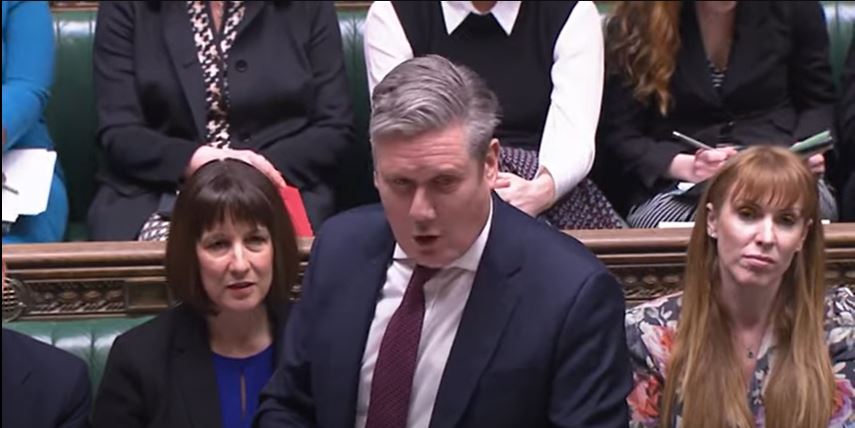The British opposition Labour Party criticized the planned reforms of the Conservative government toward pensions. The opposition said such reforms to pensions would only benefit the country’s wealthiest.
The Labour Party said on Thursday that the planned pension reforms would only benefit the wealthiest in the country. The opposition said the reforms were “the wrong priority, at the wrong time, for the wrong people.” This follows finance minister Jeremy Hunt’s budget statement, where Hunt announced that there would not be any tax penalties on lifetime pension savings that are more than $1.2 million.
Labour said the policy meant that those with over £1.4 million in their pension would end up paying around £150,000 less in taxes, especially at a time when taxpayers who pay the basic rate are struggling with higher tax bills.
“The budget was a chance for the government to unlock Britain’s promise and potential,” said Labour’s finance minister Rachel Reeves. “But the only surprise was a £1 billion pensions bung for the one percent, a move that will widen the cost-of-living chasm.”
Hunt defended the planned changes, citing that the cost was dwarfed by £94 billion of government support for households struggling with the rising cost of living. Hunt said that the pension changes were necessary to address the shortage of doctors as some long-time senior doctors have decided to cut down their working hours or have retired early upon approaching the pension limit, adding to the strains experienced by the National Health Service.
“I don’t think it is the wrong values to support our NHS,” Hunt told BBC radio. “If you’re asking what will have an impact on ordinary families up and down the country, it is getting their NHS operation done more quickly and this is the simplest and quickest way to resolve that issue.”
Labour said it intends to provide a more targeted plan for doctors.
On the same day, the British Office for Budget Responsibility said Hunt’s new budget plans would leave him with a buffer period of only £6.5 billion for hitting the target of getting debt as a share of economic output falling in a span of five years. OBR chair Richard Hughes said Hunt gave himself more leeway in November by extending the target horizon to an additional two years.



 Trump Signs “America First Arms Transfer Strategy” to Prioritize U.S. Weapons Sales
Trump Signs “America First Arms Transfer Strategy” to Prioritize U.S. Weapons Sales  Trump Signs Executive Order Threatening 25% Tariffs on Countries Trading With Iran
Trump Signs Executive Order Threatening 25% Tariffs on Countries Trading With Iran  Trump Allows Commercial Fishing in Protected New England Waters
Trump Allows Commercial Fishing in Protected New England Waters  TrumpRx.gov Highlights GLP-1 Drug Discounts but Offers Limited Savings for Most Americans
TrumpRx.gov Highlights GLP-1 Drug Discounts but Offers Limited Savings for Most Americans  Norway Opens Corruption Probe Into Former PM and Nobel Committee Chair Thorbjoern Jagland Over Epstein Links
Norway Opens Corruption Probe Into Former PM and Nobel Committee Chair Thorbjoern Jagland Over Epstein Links  Trump Backs Nexstar–Tegna Merger Amid Shifting U.S. Media Landscape
Trump Backs Nexstar–Tegna Merger Amid Shifting U.S. Media Landscape  Trump Lifts 25% Tariff on Indian Goods in Strategic U.S.–India Trade and Energy Deal
Trump Lifts 25% Tariff on Indian Goods in Strategic U.S.–India Trade and Energy Deal  Netanyahu to Meet Trump in Washington as Iran Nuclear Talks Intensify
Netanyahu to Meet Trump in Washington as Iran Nuclear Talks Intensify  TrumpRx Website Launches to Offer Discounted Prescription Drugs for Cash-Paying Americans
TrumpRx Website Launches to Offer Discounted Prescription Drugs for Cash-Paying Americans  Trump Says “Very Good Talks” Underway on Russia-Ukraine War as Peace Efforts Continue
Trump Says “Very Good Talks” Underway on Russia-Ukraine War as Peace Efforts Continue  China Warns US Arms Sales to Taiwan Could Disrupt Trump’s Planned Visit
China Warns US Arms Sales to Taiwan Could Disrupt Trump’s Planned Visit  Ohio Man Indicted for Alleged Threat Against Vice President JD Vance, Faces Additional Federal Charges
Ohio Man Indicted for Alleged Threat Against Vice President JD Vance, Faces Additional Federal Charges  Iran–U.S. Nuclear Talks in Oman Face Major Hurdles Amid Rising Regional Tensions
Iran–U.S. Nuclear Talks in Oman Face Major Hurdles Amid Rising Regional Tensions  New York Legalizes Medical Aid in Dying for Terminally Ill Patients
New York Legalizes Medical Aid in Dying for Terminally Ill Patients  Trump Endorses Japan’s Sanae Takaichi Ahead of Crucial Election Amid Market and China Tensions
Trump Endorses Japan’s Sanae Takaichi Ahead of Crucial Election Amid Market and China Tensions  Japan Election 2026: Sanae Takaichi Poised for Landslide Win Despite Record Snowfall
Japan Election 2026: Sanae Takaichi Poised for Landslide Win Despite Record Snowfall  U.S. to Begin Paying UN Dues as Financial Crisis Spurs Push for Reforms
U.S. to Begin Paying UN Dues as Financial Crisis Spurs Push for Reforms 































